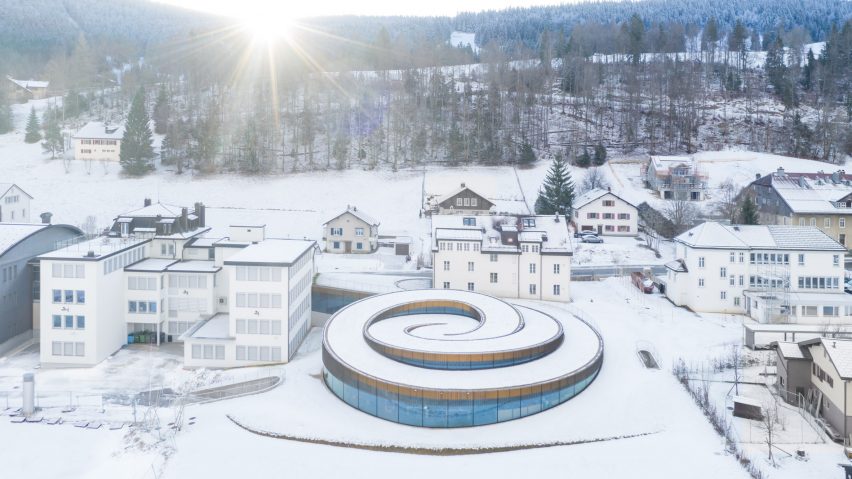Musée Atelier Audemars Piguet is a spiral-shaped building rising up out of the landscape of Vallée de Joux in Switzerland designed by BIG for the watchmaker to house its collection of timepieces.
The curved glass walls and the green roof of the BIG-designed pavilion sit next to the original Audemars Piguet workshop, which was set up in 1875.
This historic building has been restored by Swiss architecture office CCHE and connected to the new museum, which was also realised by the studio.
BIG designed the museum's curved glass walls to be load-bearing, so there are no columns or walls with the building. Bronze mesh sits over the top of the glazed facade to filter sunlight without obstructing views of the Jura mountains.
The spiral roof's shape forms clerestory windows towards the centre that are also shaded with bronze. Grass covers the roof of the building to create a lawn in summer and a snowy scene in winter.
Inside, the curved glass walls converge in a clockwise direction to channel visitors through the building as though they are walking inside the spring of a watch.
The floors are slanted to follow the gradient of the ground, rising and falling as it leads from the entrance to the centre.
German architecture studio Atelier Brückner designed the museum's exhibition spaces, which showcase 300 watches from the brand's collection.
At the centre of the spiral sits the Universelle – Audemars Piguet's most complicated watch, which was made in 1899. Other astronomical watches are arranged around this centre like planets in a solar system.
Each watch is displayed in a metal case shaped like an astronomical instrument perched on a slim column anchored to the ground.
Displays also include sculptures and moving models that demonstrate the inner workings of the watches. Benches have been set up as interactive displays for visitors who want to try their hand at watchmaking skills.
Two ateliers sit within the museum's coils, where visitors can watch the watchmakers at work. In the Grandes Complications workshop, a single watch is painstakingly assembled from 648 pieces over the course of eight months.
In the second workshop, the Métiers d'Art, jewellers and gem-setters work on the Haute Joaillerie collections.
The museum is set to open 25 June 2020.
Founded in 2005 by Danish architect Bjarke Ingels, BIG has recently completed a twisting white-brick and glass school in the USA, and a power plant in Denmark with a ski slope on the roof.
Photography is by Iwan Baan.

